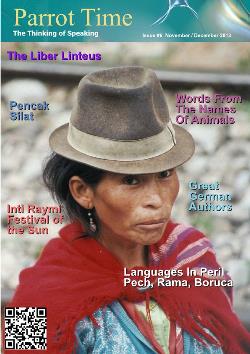
|
World Media Some people like to use foreign magazines and newspapers to aid in their learning. These materials give them access to the language as it is in every day use and not as planned exercises or stories. They become exposed to the culture of the country as well, making it easier to relate. However, unless one lives in a large city, it can often be hard to find foreign newspapers and magazines on a regular basis that also doesn't cost a lot of money for importing. Normal subscriptions of local publications can already be costly, and this can easily double or triple on imports. The internet can give people access to plenty of this media online, and most of the time its free. The amount available will of course vary among language and country, similar to access to the printed forms. Also, some languages will have no such materials if they are no longer used in modern life, such as Latin or Greek, but for at least the major languages, there is plenty available. Television and radio are also ways of broadcasting information, and there both TV and radio stations freely available for watching and listening to. These various streams might require some additional software to play, and they might not be available all the time, however. In that regard, they are no different than needing a radio or TV to get local broadcasts that are only on at certain times. Some of these stations might also offer pre-recorded shows, which are referred to as "Video on Demand" or just "VOD" for videos and podcasts for audio programs.  Web site with language teaching videos Podcasts have, in fact, become very popular on the web as a means of hearing programs. They can be found on thousands of sites, presenting just about anything. They might be played from the site in a streaming format or downloadable to be played on a computer or portable device. In this fashion, the audio learning method can be duplicated and expanded using the internet. Our German learner can download an Italian audio course and listen to it on his MP3 player. Videos are also created for the same reason. YouTube is the major site for people generated and added videos. One can easily search the site and watch music videos and movies from other countries. They will also find a huge number of language teaching videos made by others. Some are professionally done, but most are likely to be done by regular users with their computers and video recorders. Again, all of this is free. Communities As you will have realized by now, a number of these learning systems involve interaction with other people online. To make them most effective, it becomes necessary to bring together large numbers of people and involve them in the mutual learning. When this happens, the web site takes on the form of a community, usually requiring people to register to become members. Depending on the nature of the site and the resources it offers, these might be limited in purpose, like Lang-8, or more expansive like LiveMocha. They also might be devoted to a single language, group of languages, or a huge number of languages.  Woman listening to a podcast on her MP3 player A community can greatly aid individuals in the learning of a language because they are instantly in touch with hundreds, even thousands, of others that share their interests. This is a unique opportunity, impossible using any other learning method, because it becomes a true international meeting place. As people use the community to learn a language, they can also make friends with people from all over the world, expanding not just their linguistic capabilities but also their global awareness. Of course, an online community will face many of the same problems as any large group of people. There will be people that are rude and abusive, sometimes only being there because they feel a need to be that way to others. The community should have rules against that and, hopefully, an active group of people moderating everything to remove these disruptive elements. Before that happens, it is possible to suffer some abuse from others. There is also likely to be a large number of spammers, pretending to be other members, who will try to post ads or trick people into visiting dating services. If one is easily upset by either abusers or spammers, they will have to be very guarded in using a community. Its not that this differs from situations in the "real world", but many people feel they can do these things on the internet because they have a certain amount of anonymity. A person is much more likely to be nasty when they don't have to physically face a person and risk being punched in the face. Not all communities and web sites are free, either. Some may give you some basic services, but require a certain monthly or annual fee to use the more advanced features. LiveMocha is one site that does this. When first introduced, it was completely free, but then it started charging for advanced sections as well as the most popular languages (like Spanish, French, and German). After the merger with the highly priced Rosetta Stone, many feel LiveMocha will also become more expensive. Quality The quality of the materials on any of these web sites will vary, of course. The English expression "You get what you pay for" definitely applies here. With so much of the materials being produced by individuals and offered at no cost, there is no guarantee of correctness. Getting feedback from several sources might help with that, and indeed, with there being so many sites available, one could better verify what they are learning, but some work will have to be done. If our German student would like to buy himself a new German-Italian dictionary, he can search the web and read countless reviews on them. This doesn't mean that paying for something will mean it is completely correct either. The internet makes it very simple for anyone to set up a web site and sell stuff, so it is a good idea to read reviews from other customers before buying anything. Again, that is also true about non-internet things. When it comes to buying, the internet can also greatly help someone. If our German student would like to buy himself a new German-Italian dictionary, he can search the web and read countless reviews on them. Visiting language forums and asking other learners what they use is also a great way to find something good. Once our German has learned of a great dictionary, he then has a large number of ways to obtain the book. Major books store, like Amazon and Barnes & Noble, allow people to order books online and have them shipped all over the world. Resellers, like Ebay, may also provide copies, in new or used format, at greatly reduced prices. In some cases, it might even be possible to download a copy of the book, but that is illegal and can get a person into serious trouble, especially depending on the copyright laws of their own countries, so this is not method that should be used. Other materials can be found online for purchase, like magazines and newspaper subscriptions, audio and video courses, podcasts, ebooks, courses... the list is endless. One can even sign up buy tickets to travel to another country for that immersion experience through online travel agencies. Conclusion The internet is the largest information repository on the planet, and it is growing every day, not just in the amount of material it contains, but also the mediums. In this article, we have just talked about some of the currently more popular forms of learning a language, without going too deeply into specific web sites or systems. Anyone that has access to the internet should use that chance to explore what is available to them. I'm sure there are other ways to aid in learning out there that I am not even aware of yet, so accept this article as an introduction only, not an exhaustive list. Everyone should explore what is out there and find the way that best suits them.  Man in a cafe, using a laptop to access the internet |
| Language Learning Methods - Internet | |||||||
| Writer: | Erik Zidowecki | ||||||
| Images: | |||||||
| |||||||
All images are Copyright - CC BY-SA (Creative Commons Share Alike) by their respective owners, except for Petey, which is Public Domain (PD) or unless otherwise noted.
comments powered by Disqus



















